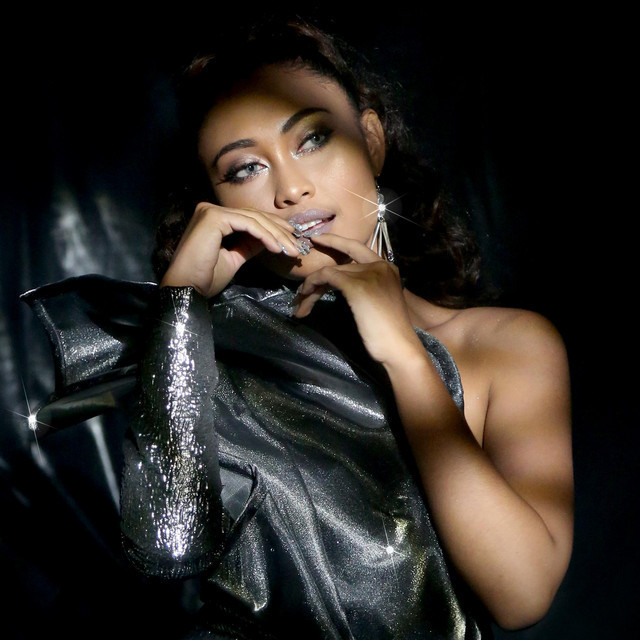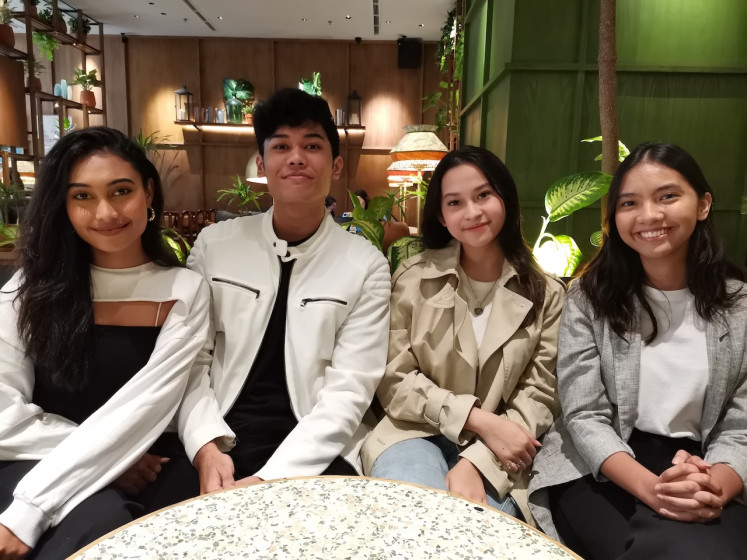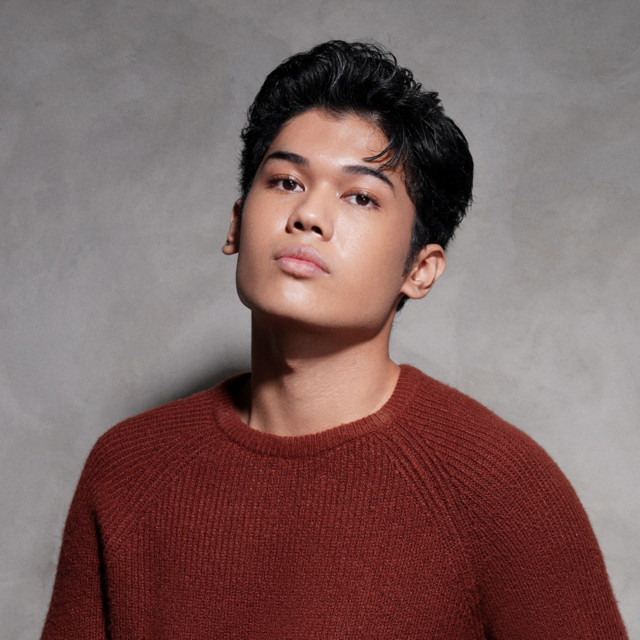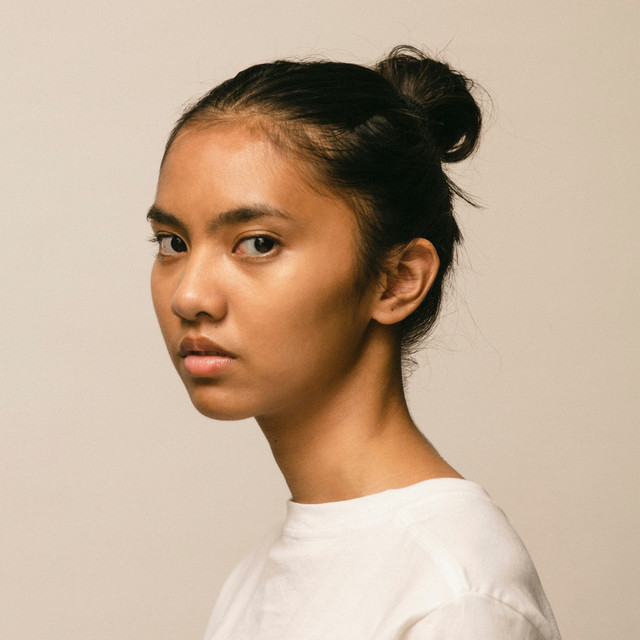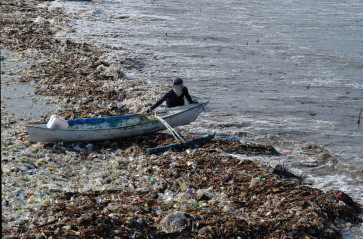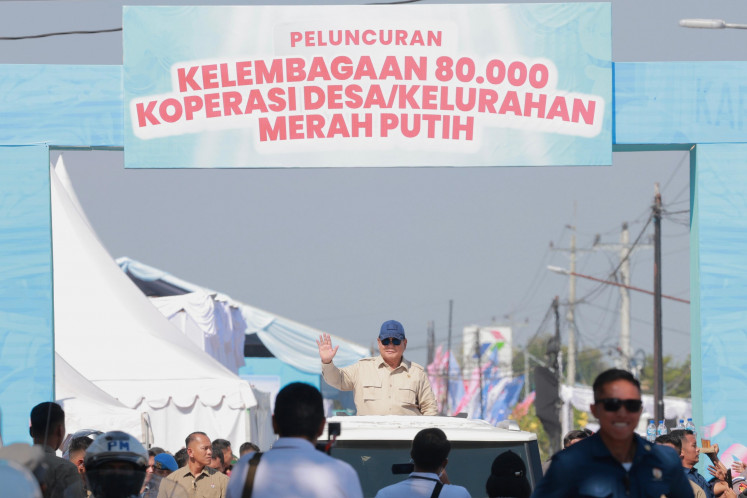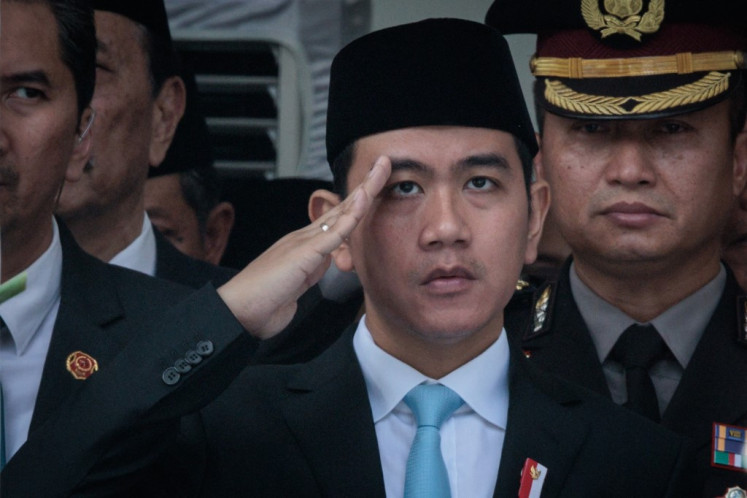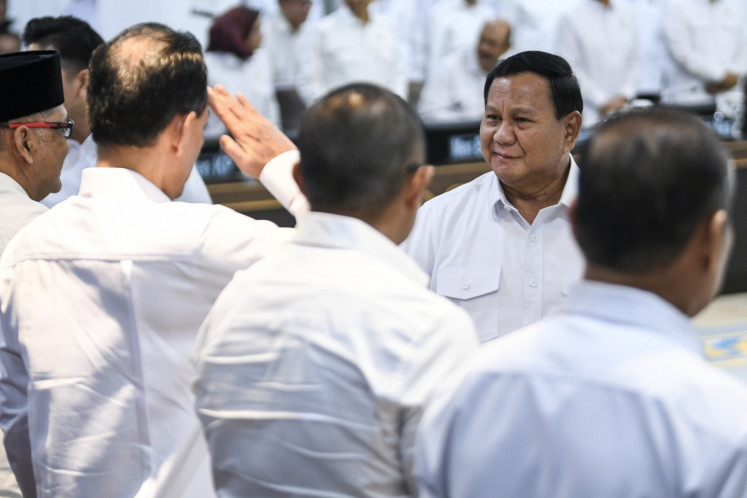Popular Reads
Top Results
Can't find what you're looking for?
View all search resultsPopular Reads
Top Results
Can't find what you're looking for?
View all search resultsMusic roundtable: AMI Awards 2021's top newcomer nominees
Anugerah Musik Indonesia (AMI) announced the nominees of this year’s AMI Awards on Oct. 18, 2021. Join four of the Best of the Best Newcomer nominees as they speak to The Jakarta Post in a roundtable interview.
Change text size
Gift Premium Articles
to Anyone
A
nugerah Musik Indonesia (AMI) announced the nominees of this year’s AMI Awards on Oct. 18, 2021. Join Dere, Novia Bachmid, Nuca and Raissa Anggiani, four of the Best of the Best Newcomer nominees, as they speak to The Jakarta Post in a roundtable interview.
---
When four of the most promising new talents – Dere (nominated for “Kota”), 19, Novia Bachmid (“Ingin Jatuh Cinta”), 19, Nuca (“Kagum”), 19, and Raissa Anggiani (“Losing Us”), 17 – gathered together in person for a roundtable interview with The Jakarta Post contributor Felix Martua on Oct. 29, buzzing excitement instantly filled the air.
Perhaps calling them “newcomers” might be an understatement, considering that every single one of them has been working hard since they were kids to break into the music industry. Now that they have their maiden AMI Awards nomination under their belt, here is an excerpt from our roundtable conversation with topics ranging from their early struggles to why aiming for a hit can make for a dangerous “ego”.
Question: When did you realize 100 percent that music was your life’s calling?
Raissa Anggiani: When I was in the fourth grade. That was the first time I felt like, maybe the music industry is where I belong. [Pauses.] This is just like sharing stories, right? I’m scared [laughs]!
Anyway, back then I was asked to [...] join a band, though to be honest, I was more into writing than making music. I loved writing poems and stories, even though they were very amateurish. Eventually, I found my love for music when I was in the fourth grade and I started picking up musical instruments. Then one day, this teacher asked me, “Is music just for fun for you, or would you like to be serious about it someday?” And I was like, “Maybe this might be it.” And it is.
Novia Bachmid: For me, it was 2013. That was the time I fought to audition for Idola Cilik [reality television children’s singing competition]. One afternoon, I was watching TV and [pop star] Agnez Mo was performing with these incredibly stunning dancers. Watching her, I thought, “How can I make a living like that?”
So when I was in the fifth grade, even though the [exams] were coming, I decided to go to that audition in Manado all by myself. I left my hometown [East Bolaang Mongondow regency, North Sulawesi] in a minivan, and inside were just me and a bunch of [jerrycans] of gasoline. I think the trip took around eight hours. I was carsick and vomiting the whole time. My parents had no idea.
Nuca: Honestly, when I was in the eighth grade. Before then, I had taken part in a couple of talent shows, but it was simply because I wanted to try and I had no self-awareness back then. A couple of years later, I tried another talent show [The Voice Kids Indonesia], and that was when I came to realize that music is my path in life.
On that talent show, I learned so much about music and I grew interested in exploring music on a deeper level. Then, I decided to audition for Indonesian Idol, but I was determined to have that be my last [outing on] the talent show circuit. Post-show, I had already figured out what I was going to do in the future.
Roundtable: The New Artist Roundtable presents (from left to right) Novia Bachmid, Nuca, Raissa Anggiani, and Dere. (Courtesy of Felix Martua) (JP/Felix Martua)Dere: I have been pretty imaginative ever since I was a kid. My imagination could be as simple as picking up a guitar, pretending that a TV remote was my mic and picturing myself singing in front of 3,000 people in my bedroom.
Since I was very little, I had this thought that one day, I would like to express myself in whatever form it could be. Then when I was in middle school and after I participated in [The Voice Kids Indonesia, where she competed with Nuca], I felt compelled that music was something I really had to do.
Now that you guys are professional musicians, your debut single is very crucial to entering the music industry. Novia, why did you decide on “Ingin Jatuh Cinta” [Want to fall in love] as your debut entry?
Novia: Out of the many songs my producer sent me, I decided to choose “Ingin Jatuh Cinta” as my debut single because I found it very relatable, lyrically. To boot, the song’s original sound was not exactly tropical pop. The original sound was a bit too 2000s for me.
[Indonesian producer/arranger] Kenny Gabriel then rearranged the song and it came out so contemporary but with a touch of Reza Artamevia’s “Berharap Tak Berpisah” [I hope we don’t split up]. I had my family listen to it, and they approved as well. On top of that, I imagined that once I got onstage, I’d like to sing something the audience could sing along with.
Considering tropipop is still relatively foreign to the Top 40 and pop fans, were you aware of the risk?
Novia: Yes, I was. When we decided on the song, [Hits Record artists and repertoire/A&R rep] Keke Kananta commented that the song might not “climb that high”. Nonetheless, he said that we should consider “Ingin Jatuh Cinta” as our means of molding my character as an artist.
Raissa, you first debuted with your duet, “If U Could See Me Cryin’ in My Room” with Arash Buana, which racked up more than 33 million plays on Spotify. How big was the pressure to follow that up with a solo single?
Raissa: That was the very first time I released a song and back then, I totally had no idea what the music industry was like. My only concern back then was to release something that I made myself, and it so happened that Arash and I were with the same label [Alfa Records]. There wasn’t any conversation yet about what my character would be as an artist.
“If U Could See Me Cryin’ in My Room” became popular, which is something I feel grateful for, but I did feel the pressure when I was about to come up with my first solo single, “Satu Tuju” [One purpose], which leaned toward folk pop. That was really when I introduced who I truly am. Since “Satu Tuju”, I decided to commit to the folk pop genre, not because I was molded to be that kind of artist, but because I loved the genre.
So far, you’ve written all your songs yourself, including “Losing Us”. Was that on purpose?
Raissa: Since the beginning, I’d wanted to write and arrange my songs all by myself whenever possible, though when it comes to the production, it all goes back to [the producer]. Still, I feel like I should contribute 100 percent of myself to my songs.
Nuca, you also debuted with a duet, “Aku Yang Salah” [I’m to Blame] with Mahalini, which became massively popular. Did you feel the same pressure for your solo debut?
Nuca: Honestly, maybe I did feel a bit [overwhelmed] by that duet. “Aku Yang Salah” created such a big impact, whereas my solo debut “Kagum” [In awe], not so much. That being said, my focus from the very beginning was on how everyone can understand what my music is like and what my genre is. The number of [YouTube] views or [streaming] plays is a different issue, I’ve found.
My point is, for my debut solo single, I wanted everyone to know who I was. I just wanted to introduce myself as who I genuinely am. I picked “Kagum” because it was inspired by a personal experience, with the songwriting by Andmesh Kamaleng. I loved the music because it was pop but not too contemporary, so it still had this segmented appeal.
How did you make sure that the final single was authentic to yourself, and not Andmesh?
Nuca: Andmesh told me that he would only be involved in the lyrics and that going forward, I should be more involved. During the production, I had a discussion with [producer] Dimas Wibisana about which instruments should be included in the song. Andmesh made no production input because he really wanted me to own that song.
What about you, Dere? Why did you pick “Kota” [City] as your debut single?
Dere: Again, it was full of surprises [laughs]. I was brainstorming with Tulus [her coach for The Voice Kids Indonesia] and we decided to write a song together. We set aside some time to write, though we didn’t have anything specific in mind. I was still lost back then when it came to [writing] a song properly. That’s why it was very unexpected that “Kota” was born that day.
Tulus and I had a sit-down in a room. We picked up our guitars, we had no idea what to write exactly, we just hummed together and finally, we came up with our first verse and it was like, “Whoa!” I liked it, Tulus liked it, and it became my first single. It wasn’t something that was planned from the get-go. The whole thing was very sudden.
'Admire': Nuca is nominated for AMI Awards' Best of the Best New Artist for his debut solo single "Kagum". (Courtesy of Spotify) (Spotify/Courtesy of Spotify)Learning from your experiences so far, when is it time to emerge as a soloist?
Nuca: For me, it depends on the timing. If we feel like this song is better off as a solo, then we should do it solo. You cannot force it to be a duet.
Dere: For me, I do dream about collaborating with [other] musicians. I even have this fantasy of writing songs for other musicians. However, for now, I feel comfortable going solo. Why? Because I’d like to explore what I’m capable of and how far I can go.
Novia: I think that exploration is very important. As of now, I’m still exploring what clicks well with me because I’m still pretty confused. Whatever the genre, I’ll try it. Whatever songs are offered to me, I’ll make the best of them.
After “Ingin Jatuh Cinta”, I would like to try a ballad next. I’ve also been performing quite often with [DJ and producer] Weird Genius. I’m still a bit confused about how I feel, though. I’m really fond of EDM [electronic dance music], but then again, I think it’s all about the moment. Whenever I perform an EDM song, I feel like a chameleon.
Novia, you’ve recently enjoyed nationwide attention thanks to your latest EDM project with Alffy Rev, “Wonderland Indonesia”, which reached No. 1 trending for music on YouTube Indonesia. What was your takeaway from that experience?
Novia: I was surprised by that project because I got the call seven days before the shoot. My “homework” was [...] to grasp how to differentiate these local folk songs, including their distinctive intonation and pronunciation. What I really learned was how to sing a bunch of different local folk songs as a singular EDM production. That's what I paid attention to the most.
Learning from the past year, what kind of mentality do you think an artist needs to have?
Raissa: Confidence is the most important thing. Back then and even now, I’m a bit shy, but thanks to radio appearances and getting to meet fellow musicians, I feel like I’m growing and becoming more confident. Also, the more we know what our music is, the better we can explain it to others. I think that’s important: knowing what we want to talk about and what our purpose is in this industry.
Nuca: Being indifferent is important.
Raissa: Agree! [Laughs.]
Novia: Definitely! [Laughs.]
Nuca: I learned about that kind of mentality from [Indonesian] Idol. We had lots of fans and when someone was eliminated, the blame game happened. Many of us felt like a failure and we [wanted] to go home as soon as possible. But as time went on, I realized that we [each] had our own path and it was up to us whether we should listen to what people said or not. We can filter out which feedback is good for us and which [are] just plain hate.
Novia: I totally agree with that. When I first started out, I [...] wasn’t brave enough to speak my mind. Perhaps it was because I was still a newbie, so I ended up saying “yes” all the time. I finally realized that was not a good habit. Now, I’m more inclined to share my opinions and be bold when dealing with people. If anyone thinks I’m being too bold or something, [whatever]. What’s important is that I [speak up].
'City': Dere is nominated for AMI Awards' Best of the Best New Artist for her debut single "Kota". (Courtesy of Spotify) (Spotify/Courtesy of Spotify)How important is it to have a massive hit?
Raissa: Oh, I’ve never asked myself that before. I don’t know about Arash, but when we were working on “If U Could See Me Cryin’ in My Room”, I was personally more concerned about building our chemistry. As for when I wrote “Losing Us”, it was my “sad girl” hour [laughs]. Even now, I try my best not to pay attention to [making] a hit.
One day, I tried [writing] with that kind of mindset, but then everything went blank and I couldn’t write anything. I got too anxious because everything felt so lacking and I ended up feeling dissatisfied. Don’t get me wrong, it’s good to feel dissatisfied because it helps us to grow. But if that dissatisfaction only leads to [a creative block]? I stopped writing for two or three months because of that.
Eventually, I decided to just be indifferent and stop thinking about the [YouTube] views and the numbers and [thought], “What’s your [purpose for] making music in the first place?” In the end, it’s usually my producers or my label that think about the whole marketing stuff.
Dere: I agree with Raissa. I’m not going to lie, I dream about one day [creating] something that will blow the minds of a lot of people. That dream exists, but only in the back of my head because once that ego pops up while I’m writing, the song usually ends up like, “Ew!”
Raissa: Yes, exactly! [Laughs.]
Novia: I once had that massive expectation, that I wanted to make something that could rack up millions of [YouTube] views. However, thinking about [other] artists who had that same expectation only to end up falling short became a kind of wake-up call for me. That’s why now I simply focus on making music. When the time is right, my music will climb [the charts] and speak for itself. Besides, if we push ourselves to [try and] make a hit, what’s left is just stress. We won’t feel motivated to keep going.
In recent years, it seems like Indonesian artists are keen to return to making albums. How important is this for you?
Novia: That is a very big dream of mine, having an album. Someday, I would like to perform in a solo concert singing my own songs. However, I dream of this album offering all kinds of genres. I want to make something that people don’t expect. Adding to that, I remember that in my hometown, people still listen to CDs because the internet [connection] there can be pretty unstable. It’s impossible for them to [play] my music on Spotify, so it would be cool if they could listen to my songs on a CD.
Nuca: I really, really want an album. That being said, I don’t want to rush it. Personally, I would like to write the majority of my album and I have been keeping songs that I wrote myself. Perhaps the songs are not single material because I cannot be too idealistic, especially with my label in mind. Nevertheless, I want that album to tell my stories because honestly, I’m not that interested in the number of [YouTube] views.
Dere: I think it would be fun if each single could be an Easter egg for my [full-length] album.
Raissa: I consider an album to be an artist’s identity, so I would love to have one someday.
What does your first-ever AMI Awards nomination mean to you?
Nuca: Honestly, I feel more empowered. Our music is being appreciated, even though we come from different genres. I guess we can also call ourselves lucky. Going forward, I want to top myself even more, though that’s not necessarily about getting more nominations in the future.
Novia: I never expected to see my name in this category [Best Newcomer], though lately I’ve been wanting to [be nominated]. I mean, who wouldn’t want to be nominated for the AMI Awards? [...] but we never know what our luck might be.
Raissa: I didn’t even put the AMI Awards on my list of goals because I felt like I was still far behind, so I was surprised by this nomination. Perhaps the music industry has started becoming more progressive and to appreciate different music genres, too. Is this validation? Yes. Do I also see this as recognition? Very much so.
Dere: Making music is exhausting, but it’s also fun. And when I got my nomination, I became more appreciative of that process [...].
Let’s close on a hopeful note. What kind of artist would you like to be in the next 10 years?
Raissa: In the next 10 years, I want to have [toured] both nationally and internationally. Because I want to reach international audiences, I want to write more English-language songs as well. I want everyone to know me as a musician who is professional, consistent, productive and [who] makes something that isn’t just popular for the moment but also resonates for a long time. I want to also produce my own songs.
Nuca: Every time I watch music festivals on YouTube and see the performer singing along with a sea of people, I want to do something like that.
Dere: This might be a bit biased, but I want to create a significant impact. Maybe 10 years from now, I can purchase land and build a forest. Because forests are so important.
Novia: If Raissa is going to be Indonesia’s Taylor Swift, then I’m going to be Indonesia’s Queen Bey [Beyoncé]. [Laughs.] Ivve also been thinking of how I can bring the “Wonderland Indonesia” project to international audiences.
This roundtabe interview has been edited for length and clarity.

